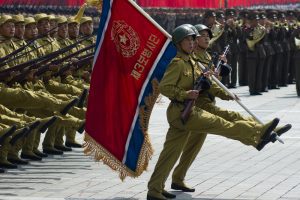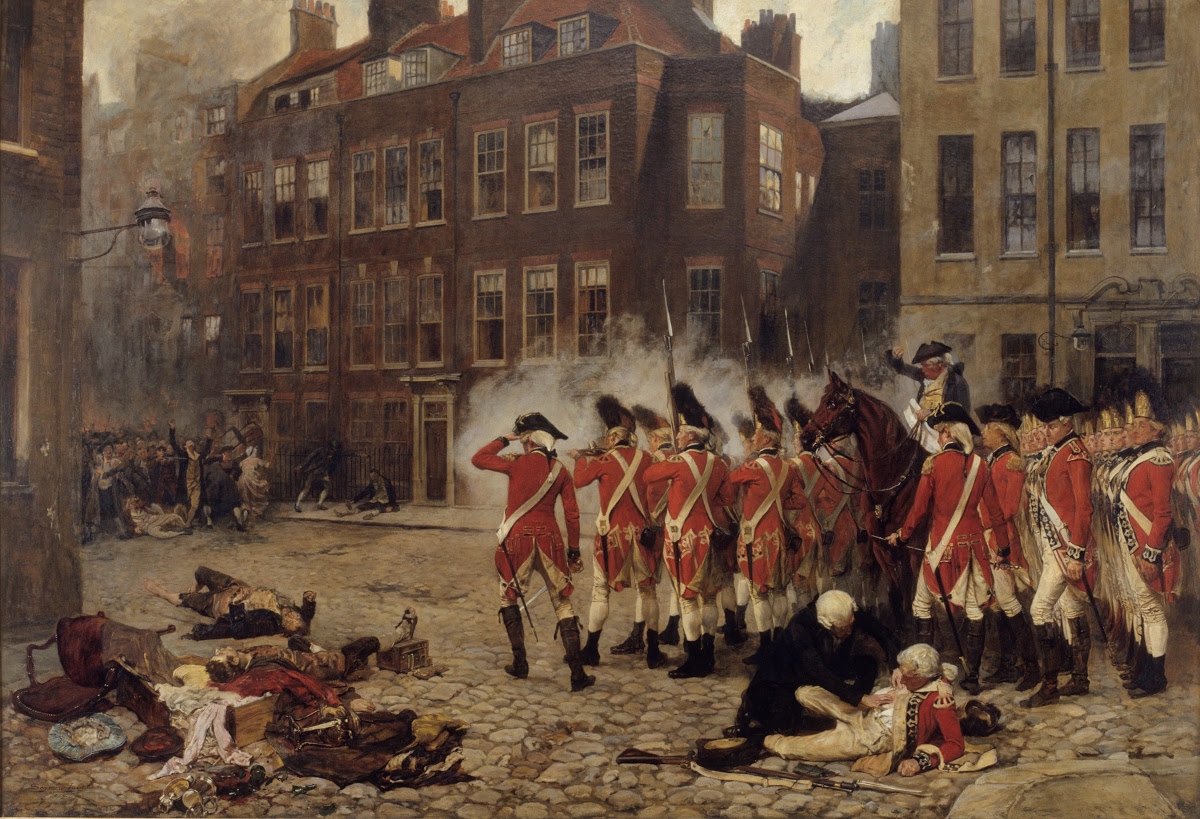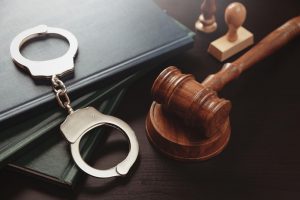 Movies and TV
Movies and TV  Movies and TV
Movies and TV  History
History 10 Dirty Government Secrets Revealed by Declassified Files
 Weird Stuff
Weird Stuff 10 Wacky Conspiracy Theories You Will Need to Sit Down For
 Movies and TV
Movies and TV 10 Weird Ways That TV Shows Were Censored
 Our World
Our World 10 Places with Geological Features That Shouldn’t Exist
 Crime
Crime 10 Dark Details of the “Bodies in the Barrels” Murders
 Animals
Animals The Animal Kingdom’s 10 Greatest Dance Moves
 Movies and TV
Movies and TV 10 Box Office Bombs That We Should Have Predicted in 2025
 History
History 10 Extreme Laws That Tried to Engineer Society
 History
History 10 “Modern” Problems with Surprising Historical Analogs
 Movies and TV
Movies and TV 10 Movie Adaptations That Ruined Everything for Some Fans
 History
History 10 Dirty Government Secrets Revealed by Declassified Files
 Weird Stuff
Weird Stuff 10 Wacky Conspiracy Theories You Will Need to Sit Down For
Who's Behind Listverse?

Jamie Frater
Head Editor
Jamie founded Listverse due to an insatiable desire to share fascinating, obscure, and bizarre facts. He has been a guest speaker on numerous national radio and television stations and is a five time published author.
More About Us Movies and TV
Movies and TV 10 Weird Ways That TV Shows Were Censored
 Our World
Our World 10 Places with Geological Features That Shouldn’t Exist
 Crime
Crime 10 Dark Details of the “Bodies in the Barrels” Murders
 Animals
Animals The Animal Kingdom’s 10 Greatest Dance Moves
 Movies and TV
Movies and TV 10 Box Office Bombs That We Should Have Predicted in 2025
 History
History 10 Extreme Laws That Tried to Engineer Society
 History
History 10 “Modern” Problems with Surprising Historical Analogs
10 People Who Beat the Rap for Treason
Universally, treason is regarded as a despicable “high crime.” In many countries, it is punishable by life imprisonment or execution and is likely to make a traitor a social pariah. Why, then, would anyone commit such a crime?
This list suggests a few motives for such a deed. These accused, which includes some well-known individuals, were either found not guilty of betraying their countries, escaped punishment, or were later exonerated, each, in his own way, beating the rap for treason.
Related: Top 10 Misconceptions About Famous Crimes And Trials
10 Billy
In 1781, Billy, a young slave, was convicted of committing treason against the state of Virginia after he was impressed into military service by the crew of a British ship. At his trial, two Prince William County jurors challenged Billy’s conviction on the grounds that, as a slave, he owed no loyalty to the state since he was not a citizen and owned neither land nor other belongings that could be subjected to forfeiture. Despite the jurors’ objections, Billy was sentenced to be hanged.
The state’s governor, future U.S. President Thomas Jefferson, agreed with the jurors and granted a stay of execution. The following month, the Virginia legislature nullified the “illegal” indictment. As a result, Billy escaped execution, although he was returned to his “owner,” John Taylor, to continue his life of forced servitude.[1]
9 Der Spiegel Staff

In 1962, Rudolph Augstein, the publisher and editor of the German news magazine Der Spiegel (The Mirror), was arrested on suspicion of having committed treason by having published an article on possible German military weaknesses. Later, Augstein’s deputy editor-in-chief, Conrad Ahlers, the author of the article, was arrested, as was Colonel Alfred Martin, a member of the Defense Ministry and the source for the story, which was allegedly based on military secrets. A conviction could have resulted in a sentence ranging from one year to life in prison.
The men never went to trial, thanks to a German federal court ruling that Franz Josef Strauss, the nation’s federal minister of defense, had overstepped his authority and had illegally incarcerated Augstein and Ahlers, ruling that Ahlers’s article did not include any national secrets.[2]
8 Benedict Arnold
The History website succinctly summarizes the act of treason for which Benedict Arnold was tried. He was perhaps bitter because he had been passed over for promotion several times and was in need of money due to the massive debts he incurred because of the lavish lifestyle he enjoyed with his second wife. So Arnold, on September 21, 1780, during the American Revolution, met with British Major John Andre to “discuss handing over West Point to the British, in return for the promise of a large sum of money and a high position in the British army.” The plot was foiled and Arnold, a former American hero, now became known as a traitor.
Although the pact was discovered and Andre was executed, Arnold escaped, leading British troops against the Continental Army for the remainder of the war before moving to England, where he lived until his death on June 14, 1801. In short, Arnold beat the rap for treason first by joining the enemy’s forces and then by leaving his country to live in that of its former foes.[3]
7 Aaron Burr
In 1807, former U.S. President Thomas Jefferson was subpoenaed by Aaron Burr. Jefferson’s former vice-president was on trial for treason, having attempted to enlist the aid of Britain and Spain in establishing a nation in Mexico and the southwestern parts of the American continent. One of Burr’s confederates, General James Wilkinson, decided he wanted no part of the conspiracy and notified Jefferson of the scheme. Now, Burr had asked Jefferson to release documents that would acquit him.
Due, in part, to the animosity that arose between Jefferson and Burr during Burr’s failed attempt to oppose Jefferson as a presidential candidate in the 1800 election, Jefferson no longer believed in Burr’s loyalty. Alexander Hamilton’s support of Jefferson during the election was one of the reasons that led to the duel between Hamilton and Burr, in which the former was killed. Using his right, as president, to safeguard the public’s interest, Jefferson refused to honor the subpoena; he would not support Burr’s attempt at exoneration. Nevertheless, Burr was not convicted of treason. U.S. Supreme Court Justice John Marshall found that there was insufficient evidence to support the charge.[4]
6 Jefferson Davis
As might be expected, Jefferson Davis, the president of the Confederate States of America, which consisted of eleven southern states that seceded from the United States, was charged with treason. Ironically, Davis’s defense against the charge of treason would be similar to that of the slave Billy.
Davis would argue that he could not be guilty of treason because he had lost his U.S. citizenship when Mississippi seceded from the Union. Davis was out of prison on $100,000 bail, posted by twenty wealthy men, including Cornelius Vanderbilt, when President Andrew Jackson pardoned Davis along with other former confederates as a means of keeping the peace and unifying and restoring the nation.[5]
5 Pervez Musharraf
Pervez Musharraf, the last military ruler of Pakistan, who led from 1999 to 2008 after a coup brought him to power, faced execution after he was convicted of treason. It was obvious that the sentence was passed as an act of vengeance as well as justice; the judge who delivered the special court’s ruling included the recommendation that Musharraf’s body should be dragged through the capital city’s streets and strung up in Islamabad’s central square. This decree prompted a protest by Pakistan’s military officials. However, it was unlikely that the sentence or the recommended display of the condemned man’s corpse would ever occur since Musharraf lived in exile in Dubai, United Arab Emirates.
The Lahore High Court later settled the matter, making Musharraf’s execution impossible when it overturned the former army chief’s conviction. Musharraf beat the rap because of “technicalities” associated with how the special court had been established—unless the decision of the Lahore High Court was overturned by the nation’s Supreme Court. To date, this decision has not been reversed.[6]
4 Hong Yoon-Hee

Hong Yoon-hee, then a sergeant in the South Korean army, was cut off from the rest of the South Korean troops when his country’s president, Syngman Rhee, fled invading North Korean soldiers and ordered that the Han River bridge be destroyed behind him. This stranded many, including Hong, on the wrong side of the river. He was desperate to rejoin his own military and took a friend’s advice, claiming to be the brother of North Korea’s vice prime minister and joining the enemy’s army. He planned, he said, to defect to South Korea when they reached the front.
Learning that North Korean leader Kim Il-sung had ordered a general offensive against South Korean forces, Hong fled, telling South Korean soldiers that he had vital intelligence to share. After being debriefed by American intelligence officers, he was returned to his unit, where he was accused of being a Communist agent. He was tortured and sentenced to death, but his sentence was reduced to life in prison.
Instead of serving life, he was released in 1955. He moved with his wife to the United States. There, he began to research the 1950 offensive. In doing so, he learned that Major Kim Song-jun, a North Korean defector, had been credited for the information that Hong himself had provided to American intelligence. South Korea’s Institute for Military History Compilation verified that this attribution was incorrect. A memorandum by Lt. Col. Roy E. Appleman, who had written a portion of the official American history of the Korean War, was found, in which Appleman admitted he’d attributed the intelligence to Kim because he had not been able to locate records concerning Hong and had assumed that Hong had died. As a result of this finding, a court in Seoul overturned Hong’s 1950 conviction for treason.[7]
3 Lord George Gordon

Scottish nobleman Lord George Gordon, a member of the House of Commons, was charged with treason for inciting the 1780 riots that occurred in London. Regarded as eccentric—some thought deranged—Gordon was given to making long, repeated harangues to his fellow legislators. His insistence on reading lengthy documents in their entirety, sometimes several times, alienated him from many of the House’s members, especially since many of his readings and speeches were interrupted by or included his tirade against the Catholic Church.
During a debate on April 11, 1780, he declared that his supporters believed that they had no duty to be loyal to King George III but had not, so far, planned to kill the monarch. A month later, he assured the Protestant Association, an organization established for the purpose of repealing the Papists Act of 1778, which had restored some civil rights to Catholics who pledged loyalty to the king, that he would present their petition to Parliament. On June 2, he gave his supporters a running update on which members of the legislature supported the petition.
That night, a riot broke out across London, a mob looting the city for six days. Despite appeals by the Protestant Association for their supporters “to refrain from unconstitutional proceedings” and Gordon’s offer to help restore order, he was arrested for treason and imprisoned in the Tower of London. At his trial, his attorneys cited their client’s efforts to quell the riots, with Sir James Lowther testifying that he had heard Gordon urge the rioters to “go home, be quiet, make no riot nor noise.” Thirty minutes after retiring, the jury returned to announce their verdict: not guilty.[8]
2 Anthony Cramer
Judicially, the so-called “Treason Case” (Cramer v. United States) is important because it represents the first time that the U.S. Supreme Court ruled on the Constitutional meaning of “treason.” The Court’s interpretation of the pertinent clause (Article III, Section 2) also explains why “treason prosecutions have essentially disappeared” after 1954, says Paul T. Crane of the U.S. Department of Justice’s Appellate Section.
Such charges became rare, Crane suggests, not only because the Supreme Court made treason more difficult to prove but also because the U.S. government could prosecute “acts thought detrimental to [the nation’s] wartime safety” through other laws, such as the Espionage Act or the Trading with the Enemy Act. Those laws did not involve satisfying the procedural requirements of the Treason Clause. Crane explains, “As the menu of federal crimes expanded, prosecutors had less and less reason to resort to treason charges. Why bother with the two-witness rule or the overt-act requirement when a variety of alternative (and substitute) offenses exist?”
On December 2, 1942, in one of the last trials for treason before the Supreme Court clearly defined the crime, Anthony Cramer, a German-born naturalized American citizen, was convicted of treason for aiding two executed Nazi saboteurs, Edward John Keating and Werner Thiel. Cramer was sentenced to forty-five years in prison, despite the request of federal prosecutors that he be executed. The Court concluded that Cramer had “no guilty knowledge of the projected activities of the saboteurs.” The Supreme Court overturned his conviction in a 5 to 4 decision on April 23, 1945, finding insufficient grounds for Cramer’s conviction.[9]
1 Alfred Palo Conteh

According to a trial transcript, Alfred Palo (also spelled Paolo) Conteh was charged with three counts of treason, seven counts of offenses against the Republic of Sierra Leone’s Small Arms and Ammunition Act, 2012, and three counts of perjury. His defense maintained that the prosecution had suggested that revenge had been Conteh’s motive for treason. The prosecution claimed Conteh had wanted to even the score for the 1992 overthrow of the government of his uncle Joseph Saidu Momoh and had sought to assassinate the current president to achieve this end.
The defense’s refutation of these charges contained as much scorn as facts. Conteh’s attorneys highlighted what they considered to be the absurdities of the prosecution’s claims, pointing out that Conteh went to the State House not to assassinate President Julius Maada Wonie Bio but at Bio’s own invitation, to “help [put] together a strategy and policy for combating the current COVID-19 pandemic.”
The Sierra Leone Telegraph stated that the jury unanimously found Conteh not guilty of both treason and perjury, convicting him on only two counts of unlawful gun possession. The newspaper declared that, as a result, Conteh could now face a maximum penalty of up to one year in prison or a fine of Le 5 million—or both—unless the president pardoned him. It also seemed likely that the court would reduce Conteh’s sentence by the number of months that he had been incarcerated during his trial. Instead, on July 3, 2020, Conteh received a sentence of two years in prison for his two unlawful gun possession convictions. Like the others on this list, he had beaten the rap for the far more serious charge of treason.[10]








